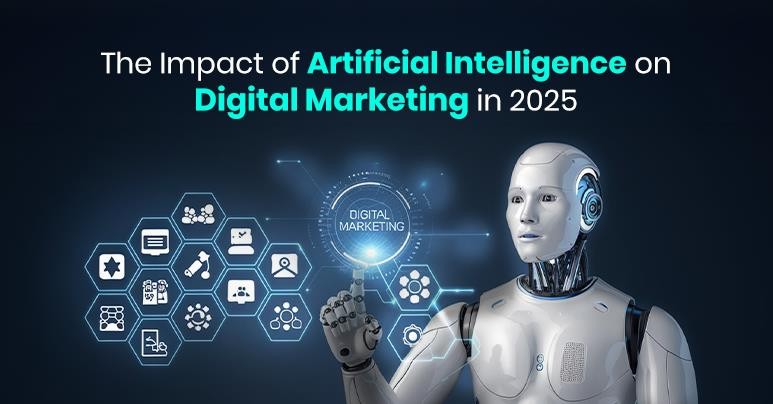Artificial Intelligence (AI) has revolutionized digital marketing, transforming how brands engage with audiences, optimize campaigns, and deliver personalized experiences. As we progress through 2025, AI is no longer a futuristic concept but a core component of marketing strategies, driving efficiency, creativity, and data-driven decision-making. From hyper-personalization to predictive analytics, AI’s influence is reshaping the digital marketing landscape in profound ways.
1. Hyper-Personalization at Scale
One of the most significant impacts of AI in digital marketing is its ability to deliver hyper-personalized experiences at scale. AI-powered tools like Dynamic Yield and Adobe Target analyze consumer behavior in real-time, enabling marketers to tailor content, product recommendations, and messaging to individual preferences. For instance, e-commerce platforms can dynamically adjust homepage displays based on a user’s browsing history—showing jackets to someone who previously searched for winter wear while highlighting shoes for another visitor.
This level of personalization extends beyond websites to email marketing, where AI customizes subject lines, content, and send times to maximize engagement. Netflix and Amazon are prime examples, using AI-driven recommendation engines to enhance user experience and retention.
2. AI-Powered Content Creation
Generative AI has matured, enabling marketers to produce high-quality content—from blog posts and social media captions to videos and ad creatives—in minutes. Tools like ChatGPT, Jasper AI, and Synthesia streamline content production while maintaining brand voice and relevance. For example, AI can generate multiple ad variations for A/B testing or transform a blog post into a video script, significantly reducing production time.
However, human oversight remains crucial to ensure accuracy, brand alignment, and emotional resonance. As AI-generated content floods the digital space, brands must balance automation with authenticity to stand out.
3. Predictive Analytics for Smarter Decision-Making
AI’s predictive capabilities allow marketers to anticipate customer behavior, optimize budgets, and refine targeting strategies. Platforms like Meta Ads and Google Ads use machine learning to identify high-value audiences, forecast trends, and adjust bids in real-time.
For instance, lead scoring models prioritize prospects based on their likelihood to convert, while demand forecasting helps businesses manage inventory and marketing spend more effectively. This shift from reactive to proactive marketing ensures brands stay ahead of competitors by leveraging real-time insights.
4. AI-Optimized Advertising Campaigns
Automation in paid advertising has reached new heights with AI-driven platforms like Google’s Performance Max and Meta’s Advantage+, which handle targeting, bidding, and creative optimization with minimal human intervention. These tools analyze performance data to allocate budgets efficiently, ensuring ads reach the right audience at the right time.
While this automation boosts efficiency, some marketers express concerns about reduced transparency in campaign adjustments. Striking a balance between AI autonomy and human oversight will be key in 2025.
5. Cookieless Targeting and AI-Driven Segmentation
With the decline of third-party cookies due to privacy regulations (e.g., GDPR, CCPA), AI is filling the gap by leveraging first-party data and advanced segmentation. Tools like HubSpot and Klaviyo help businesses analyze customer interactions without relying on cookies, creating lookalike audiences and refining targeting strategies.
AI also enables synthetic data generation, allowing marketers to model consumer behavior in privacy-compliant ways. This innovation ensures personalized marketing persists despite stricter data regulations.
6. The Rise of AI Influencers and Visual Search
Virtual influencers, such as Lil Miquela, are evolving into interactive, AI-driven personalities capable of engaging audiences at scale. Meanwhile, visual search technology (e.g., Google Lens, Pinterest Lens) lets users discover products by uploading images, enhancing e-commerce discoverability.
Challenges and Ethical Considerations
Despite its benefits, AI adoption faces hurdles:
• Data privacy concerns and regulatory compliance.
• Over-reliance on automation, risking loss of human creativity.
• Bias in AI algorithms, which may skew targeting or content recommendations.
Marketers must address these challenges by prioritizing ethical AI use, maintaining transparency, and combining AI efficiency with human ingenuity.
Conclusion
AI’s impact on digital marketing in 2025 is undeniable, enabling hyper-personalization, efficient content creation, and data-driven strategies. As AI continues to evolve, marketers who embrace these tools while upholding ethical standards and human creativity will thrive in an increasingly competitive landscape. The future of marketing lies not in replacing humans with AI but in leveraging its power to enhance customer connections and drive meaningful results.
By integrating AI strategically, brands can unlock unprecedented opportunities, ensuring they remain agile and relevant in the fast-paced digital world.





